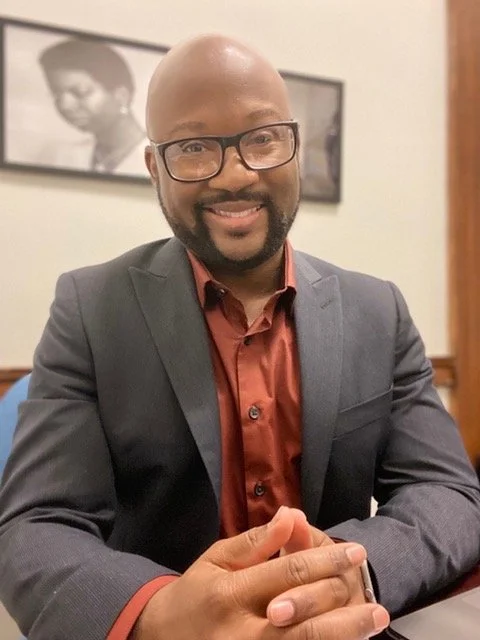Member Spotlight highlights the work of our members
Jajuan S. Johnson, Ph.D.
Member Spotlight, October 2023
Jajuan S. Johnson, Ph.D.
“In his scholarship, he persists that traumatic pasts have material consequences that presently impact marginalized people. ... Land dispossession and removal is a major part of the African American narrative ... so he collaborates with descendant communities who are recovering the narratives and marking the places built by their ancestors. ”
Tell us about yourself and your work:
Jajuan Johnson, the Mellon Foundation Postdoctoral Fellow with the Lemon Project: A Journey of Reconciliation at William & Mary, is a public historian and heritage studies scholar with research and teaching expertise on Africana Studies research methods, slavery and memory, and racial terrorism. He earned a Master of Arts and Doctor of Philosophy in Heritage Studies at Arkansas State University.
His dual research track explores the power of places of difficult histories and heritage to generate a collective sense of community in the aftermath of traumatizing events of the distant and recent pasts. He explores these dynamics in his dissertation, "'They Didn't Burn Down Our Spirits:' Heritage Terrorism and Black Church Burnings in the Age of Obama." The study has evolved into his first book project, Black Church Burnings in the Wake of Freedom: Terror, Survival, and Reclamation.
Drawing on Africana, critical race, and feminist theories, his work on heritage landscapes critically interrogates dominant narratives of cultural memory and questions historical injustices in the United States and transatlantic contexts in the late nineteenth and twentieth centuries.
Dr. Johnson's career in public history spans more than a decade. As the Director of Research and Public Programming with Mosaic Templars Cultural Center: A Museum of African American History, he piloted community-engaged research initiatives whereby local Black communities guided the interpretation of state-wide Black history. While the Assistant Director of the Starr Center at Washington College in Maryland, he co-led the Mellon Foundation-funded Chesapeake Heartland: An African American Humanities Project focused on digitizing, preserving, and making accessible materials related to African American history and culture in Kent County, Maryland and beyond.
He continues public history work with William & Mary's Lemon Project: A Journey of Reconciliation. The Lemon Project is a multifaceted and dynamic attempt to rectify wrongs perpetrated against African Americans by William & Mary through action or inaction. An ongoing endeavor, this program will focus on contributing to and encouraging scholarship on the 300-year relationship between African Americans and W&M and building bridges between the university and Williamsburg and Greater Virginia Tidewater area.
Dr. Johnson’s post is part of the Mellon Foundation funded initiative, “Sharing Authority to Remember and Reinterpret the Past.” In his scholarship, he persists that traumatic pasts have material consequences that presently impact marginalized people. To that end, he researches the university's historical ties to slavery and its legacies. He works with descendant communities to make ancestral connections to persons enslaved by the university or its associates, such as faculty and Board of Visitors members. Land dispossession and removal is a major part of the African American narrative in the Historic Triangle Area (Williamsburg, York County, James City County), so he collaborates with descendant communities who are recovering the narratives and marking the places built by their ancestors.
Dr. Johnson was a 2022-2023 Cultural Vistas Fellow, a transatlantic network of experts who promote an inclusive and progressive culture of remembrance in public spaces in Germany and the United States. He has been published in Ethnohistory, Southern Cultures, and the Arkansas Review: A Journal of Delta Studies. He has forthcoming essays in the books Preserving Culture in Times of Crisis and Change Convening and Religion and American Politics: Domestic and International Contexts.
What does being an ACHS member mean to you?:
ACHS has strengthened my connection with colleagues in the discipline of Heritage Studies. Through the Early Career Research Network, I’ve had the opportunity to expand the reach of my scholarship while creating a community for fellow scholars to find their voice in this field.
Know someone who should be featured? Reach out to us at info@criticalheritagestudies.org.

